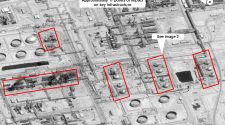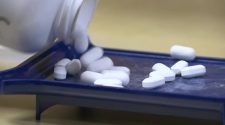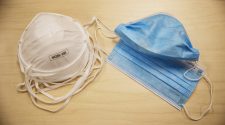MARINETTE—Aside from the potential of serious adverse human health consequences and the slow legislative policymaking regarding issues of per- and polyfluoroalkyl substances (PFAS), another big challenge looming on the front of those toxic forever chemicals concerns the extreme costs associated with remediation of contaminated sites. Clean up and remediation of those sites requires the proper monitoring of water and wastewater, safe disposal of PFAS-contaminated soils and other substances … and money.
In Marinette, that includes finding a cost-effective solution to properly dispose of the treated biosolids that accumulate every time a resident flushes the toilet, lets the soapy dishwater spiral down the drain or carries out any number of household activities involving home plumbing (see PFAS SOURCES).
But thanks to the research and effort of the city’s Water and Waste Water Department, a refined technology out of China promises to convey tremendous cost savings in biosolids disposal for Marinette.
“We feel that we will likely have some of the newest technology to manage it for the long term,” Mayor Steve Genisot told the EagleHerald.
Sometime in mid-to-late June, Marinette Water and Wastewater Operations Manager Warren Howard expects to implement operations of an advanced drying technology system at the city’s wastewater treatment plant (WWTP). Designed by China-based Guangzhou Shincci Energy Equipment Co., Ltd. (Shinnci), the new biosolids dryer promises an estimated cost savings of about $600,000 per year associated with the transport of Marinette’s biosolids off-site to a licensed disposal facility located in the State of Oregon.
Moreover, Tyco Fire Products LP (Tyco) and its parent company Johnson Controls Inc. (JCI) reimbursed the city to help pay for the new system.
“As a leading employer in the region and a company committed to environmental stewardship, Tyco donated $1.3 m to help the city purchase equipment to treat their biosolids while we hope DNR will work to identify the sources that still contribute PFAS,” read a statement submitted to the EagleHerald from officials representing Tyco.
Since 2017 JCI/Tyco have remained engaged with various state and local officials in ongoing site investigations and remediation efforts to address PFAS contamination caused by activities related to fire suppression testing operations at a Tyco facility in Marinette. Tyco also is also a defendant in a recent $17.5 million lawsuit settlement in U.S. District Court with many Town of Peshtigo (TOP) residents, stemming PFAS contamination of many private drinking water wells in TOP, resulting from Tyco operations.
- According to Howard and WWTP Lab Technician/Pretreatment Coordinator Gabe Aschbacher, once up and running, the technology should allow the Water and Wastewater department to allocate a budget of about $120,000 per year for disposal of biosolids, far less than what the WWTP would pay without the technology.
“At the end of the day this technology is something that … is pretty slick and it looks like it is going to work for us,” Howard said. “It is an interesting technology … and Tyco paid for a majority of it.”
To understand why the city is acquiring this new technology, one must understand the source and the costs of PFAS contamination up to this point in time.
Starting in the 1970s, Tyco began testing firefighting foams at its Fire Technology Center (FTC) in Marinette. PFAS served as a primary constituent in those foams. Under permit, they legally discharged runoff from their testing facility into the city’s wastewater system during those years, contaminating the city’s biosolids.
Prior to the revelations of PFAS contamination, for years the city spread about 1 million gallons annually of biosolids onto outlying county farm fields as fertilizer. But after learning of the contamination in 2017, Marinette officials ceased landspreading operations. By then, PFAS from those land-spread biosolids had already leached into the soil and private drinking water wells of several Marinette County households located near those fields.
Despite the lack of state regulatory standards on PFAS levels in biosolid landspreading operations, officials with the city and the WWTP agreed in the interest of safety, another solution to biosolids disposal was needed.
“The likelihood of ever putting it on fields in the near future is pretty remote and probably not the right thing to do,” said Mayor Steve Genisot. “The first steps we took were to remove and properly dispose of the (initially contaminated biosolids).”
For two years following the city’s stoppage of land spreading operation, its biosolids continued to accumulate in WWTP holding tanks while officials determined how to address the issue. In 2019 JCI and Tyco agreed to provide financial assistance to the city, paying approximately $3 million to cover the shipment and proper disposal of millions of gallons of stored sludge to a licensed facility in Oregon. Since that time the city, Tyco and JCI have maintained ongoing discussions regarding proper steps to achieve what is right and what protects area residents in the long term from further PFAS exposure.
“We’ve had lots of discussion and negotiation with JCI and their attorneys,” Genisot said. “(JCI/Tyco) know it’s their issue, as we (the city) realize it is not going to be their issue forever. Once we deal with it and address it, we can’t continue to charge them for (our biosolids disposal) for the next 20 years … but I think they needed to (assist financially) to resolve the issue that we knew was there. We’ve been upfront and honest with them. … they came to the table and they paid for the first time at their cost of (approx.) $3 million; and they’ve come to the table a second time for $1.3 million (for new drying equipment).”
SHINCCI SOAKS UP THE COSTS
The new biosolids dryer technology comes in the form of an SB9600 low-temperature high-efficiency sludge dryer. (see How the dryer works)
The dryer operates through an integrated and closed-loop system of dewatering and convection drying, all contained within a room-sized machine.
Once operational, the new dryer will transform Marinette’s raw biosolids from a murky fluid sludge consisting primarily of water into an approximately one-ton mixture per day of a substance with the appearance and texture of soil and only consisting of 10% or less water content. That makes it significantly lighter in weight than the old method which produced a watery biosolid solution consisting of a slurry that contained about 98% water. The cost savings results in large part to the efficiency of the drying technology in removing excess water weight which attributes to the cost burden of transporting the waste to Oregon. Without the dryer technology, the tonnage generated by that water would skyrocket, as would the cost.
According to Howard, hauling sludge to Oregon runs at about $400/ton. He estimates the city will generate approximately 25 tons of processed and dried biosolids per month with the new system. That necessitates a budget of $120,000 per year to address biosolids.
“We (the city) are not going to haul it out to Oregon again for $3 or $4 million,” Warren pointed out, alluding to the amount JCI/Tyco paid the first time in 2019. “But we can haul it out to Oregon for $120,000. That is manageable, that is something our budget can absorb.”
When used as a land application for agricultural purposes, biosolids must adhere to certain limits on various pollutants such as lead and arsenic that pose human or environmental risks. In 1993, the U.S. Environmental Protection Agency (EPA) implemented regulations for land application of biosolids in regards to many of those pollutants. PFAS is not yet included.
Until such limits or regulatory standards for PFAS land application exist, Genisot feels the dryer is the right way to go. Additionally, he pointed out the new dryer prepares Marinette for a future when those regulations do emerge.
“I think we will be ahead of a lot of the municipalities that will have to deal with (similar PFAS issues),” he said. “By decreasing (water content and thus significant weight) you are going to save trucking cost … it definitely will be better for the future … This will be the best course to keep the volume low and be able to manage it and get rid of it properly and financially.”
Warren agreed, explaining that until more science on PFAS emerges and other solutions can be implemented, transporting Marinette’s biosolids to Oregon represents that the best recourse, for now.
“And the public wouldn’t want us to spread it on fields right now,” Warren said. “Since Tyco has stopped sending (foam discharge) to us, our (PFAS biosolid) numbers have gone down quite a bit. We think (the new dryer) is the best way to go … we want to be responsible moving forward. Even if it is just a little bit (of PFAS), I don’t want to spread it on the fields … I want my legacy to be that we tried to do the right thing.”
















